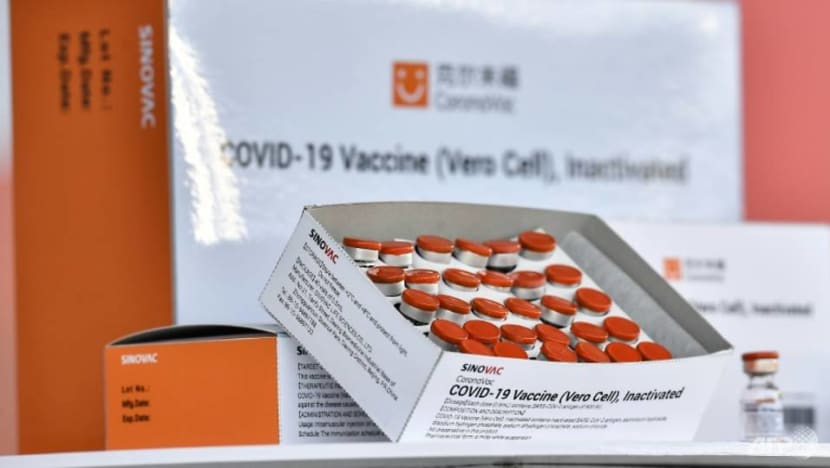Some Singapore private healthcare providers consider offering Sinovac's COVID-19 vaccine after WHO approval

File photo of Sinovac's COVID-19 vaccine. (Photo: AFP/Lillian Suwanrumpha)
SINGAPORE: At least two private healthcare operators are considering offering WHO-approved vaccines, including China's Sinovac shots, which was approved for emergency use by the World Health Organization (WHO) on Tuesday (Jun 1).
Farrer Park Hospital said in response to queries from CNA on Wednesday that it is working closely with the Health Sciences Authority (HSA) to secure Sinovac’s COVID-19 vaccine.
However, it added that the pricing for the vaccine has yet to be determined.
Thomson Medical said it is also considering offering WHO-approved vaccines to suitable patients who require them.
“Thomson Medical currently already offers the Moderna vaccine free of charge for outpatients with risk factors identified by the Ministry of Health (MOH), and is also preparing to offer vaccination services for our pregnant mothers to provide holistic care,” said Dr Daniel Lee, general manager and chief operating officer of Thomson Medical.
It added that it will make plans to offer COVID-19 shots to pregnant women as well as the Sinovac shots once it receives further details and guidance from MOH.
READ: Sinovac COVID-19 vaccine to be allowed in Singapore under special access route after WHO approval
MOH had announced on Monday that it would allow the private healthcare sector to bring in unregistered COVID-19 vaccines under the special access route, as long as they have been approved by the WHO.
This means that people who cannot take the two COVID-19 vaccines currently authorised in Singapore would have access to alternative vaccines.
The two vaccines currently authorised in Singapore are the Pfizer-BioNTech and Moderna vaccines, which are both based on mRNA technology.
The mRNA vaccines, however, are not suitable for people with a history of severe allergic reactions such as anaphylaxis and for immunocompromised individuals.
WHO's list of approved COVID-19 vaccines for emergency use includes viral vector vaccines from Johnson & Johnson and Oxford-AstraZeneca as well as the inactivated virus vaccines from Sinopharm and Sinovac.
READ: People who want alternative COVID-19 vaccines can get them under special access route
Singapore received its first shipment of the Sinovac vaccine on Feb 23, but the Health Sciences Authority (HSA) has not approved the two-dose vaccine for use here yet.
In a statement on Wednesday, MOH confirmed that the Sinovac vaccine would be allowed under the special access route, and that the ministry would soon release more details for private healthcare institutions to apply to be licensed providers for those shots.
It added that it was also studying the possibility for private healthcare institutions to access its existing stock of 200,000 doses, and was working out details on pricing, informed consent process and safety for patients who opt for the Sinovac shot.
It also reiterated that Sinovac is not part of the national vaccine programme and therefore would not be covered under the Vaccine Injury Financial Assistance Programme for COVID-19 Vaccination.
READ: Will taking a painkiller before the jab help? Your COVID-19 vaccine questions answered
Professor Teo Yik Ying, dean of the National University of Singapore's Saw Swee Hock School of Public Health said allowing people to access alternative vaccines could help to increase the overall vaccine uptake and coverage of Singapore's population.
Currently, more than 30,000 people are unable to take the Pfizer-BioNTech and Moderna vaccines due to medical reasons such as a history of anaphylaxis or allergies.
He also noted that there is also a small segment of the population that prefers vaccines that do not utilise mRNA technology.
“By allowing these people to access other vaccines that will be medically suitable and more acceptable, this allays the concern of these people towards COVID-19 vaccination, and hopefully increases the accessibility of vaccines," he said.
BOOKMARK THIS: Our comprehensive coverage of the coronavirus outbreak and its developments
Download our app or subscribe to our Telegram channel for the latest updates on the coronavirus outbreak: https://cna.asia/telegram












